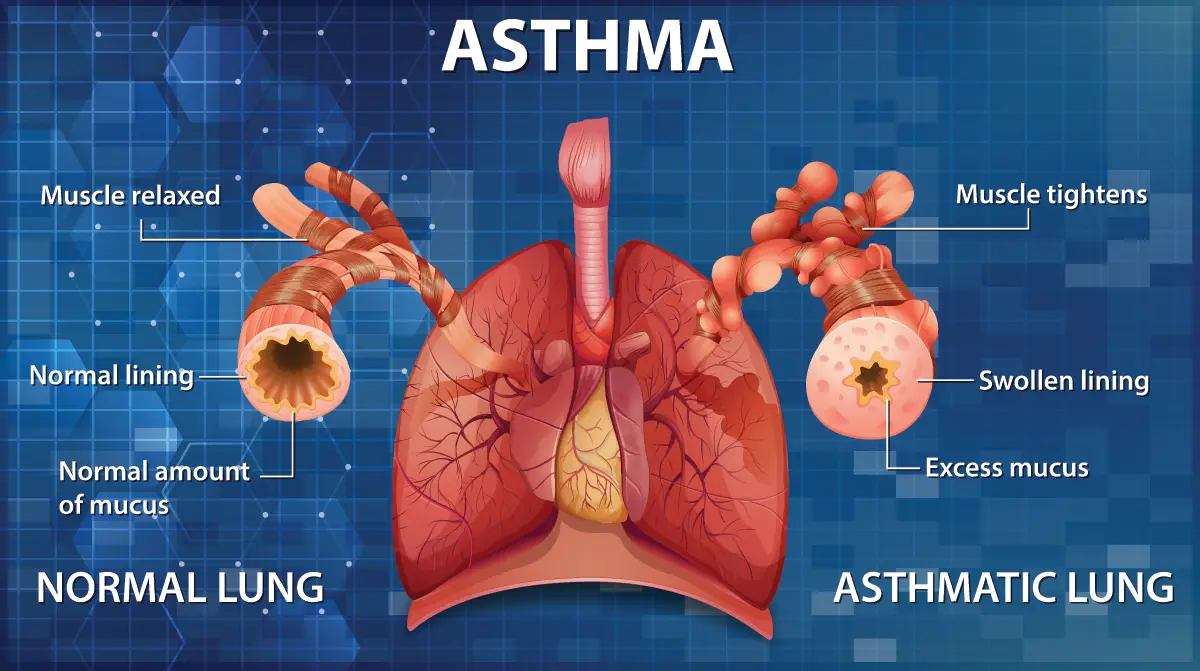What is Asthma?


Asthma affects 235 million people worldwide. It's a chronic condition of the airways – the small tubes that carry air in and out of our lungs. Asthma causes these small tubes to become blocked, tightened or swollen, making it difficult to breathe.
Asthma is not age-specific and can affect both children and adults. It affects different people in different ways and can be mild, moderate or severe.

Those suffering from asthma may experience:
There are 3 main things that can happen during an asthma attack. These are:
These factors make it harder for air to pass through the airways and results in the symptoms mentioned above. If left untreated, asthma can be dangerous and may cause permanent damage to the airways.
No, asthma is an incurable condition. However, in this day and age there are great asthma treatment options available that allow those suffering from asthma to lead a normal and active life. By talking to your doctor you can establish the best management plan specific to your type of asthma. If you manage your asthma well, you should only have occasional symptoms.
Intermittent and persistent asthma are categories used to describe the frequency of your symptoms and attacks. These categories are determined by the regularity of your asthma symptoms before you are put on medication.
Intermittent asthma is when you don’t have asthma symptoms all the time, but you may have symptoms that come and go. These symptoms may be mild, moderate or severe asthma attacks. People with intermittent asthma don’t usually need daily asthma medication and may instead be prescribed with a quick reliever medication. If you have more frequent symptoms you may also be prescribed with a preventer.
Persistent asthma is when your symptoms and attacks are more regular. In this case your doctor will most likely prescribe you with a preventer to control these attacks and symptoms. The amount of medication you need to take will depend on whether your asthma is mild, moderate or severe.
Asthma can develop at any stage in your life. If you are experiencing asthma symptoms you should get checked by a doctor. If you have asthma your doctor will talk you through the best management plans and prescribe you with the suitable medication.
To learn more about first aid management for asthma, read Guideline 9.2.5 [PDF] by the Australian Resuscitation Council.
If you are required by your workplace to be certified in first aid, check out our first aid courses.
Asthma emergencies can be frightening, confusing, and even life-threatening. Arm yourself with the knowledge of how to recognise and treat an asthma episode and asthma emergency with our fully-online Asthma First Aid course.
Or if you need asthma knowledge and skills for your workplace, our Workplace Asthma Management and First Aid gives you the skills and knowledge to be able to develop an asthma risk assessment and emergency management strategy to handle asthma episodes in the workplace. If you want to go one step further, our Workplace Asthma and Anaphylaxis Management and First Aid course also includes what you need to know about allergies and anaphylaxis.
All of our online courses can be completed at your work desk or in the comfort of your own home, with a Certificate of Completion to hand to your employer, put on your resume, or simply give you the peace of mind knowing that you can actually be helpful in an emergency situation.

October 2, 2013
In an asthma or anaphylaxis emergency you should know the symptoms, remove triggers, and know how to respond. Read on to understand these important aspects in the context of such an emergency.

May 7, 2024
Asthma, a chronic respiratory condition affecting millions worldwide, is often shrouded in myths and misconceptions. Despite how common it is, there is a distinct lack of common knowledge. This is leading to potential mismanagement and unnecessary anxiety for those living with asthma.

February 19, 2024
For many Australians, our city and outdoor lifestyles come with a hidden challenge – dust allergies. Dust mites, pollen, and other airborne particles can trigger allergic reactions, affecting a significant portion of the population.